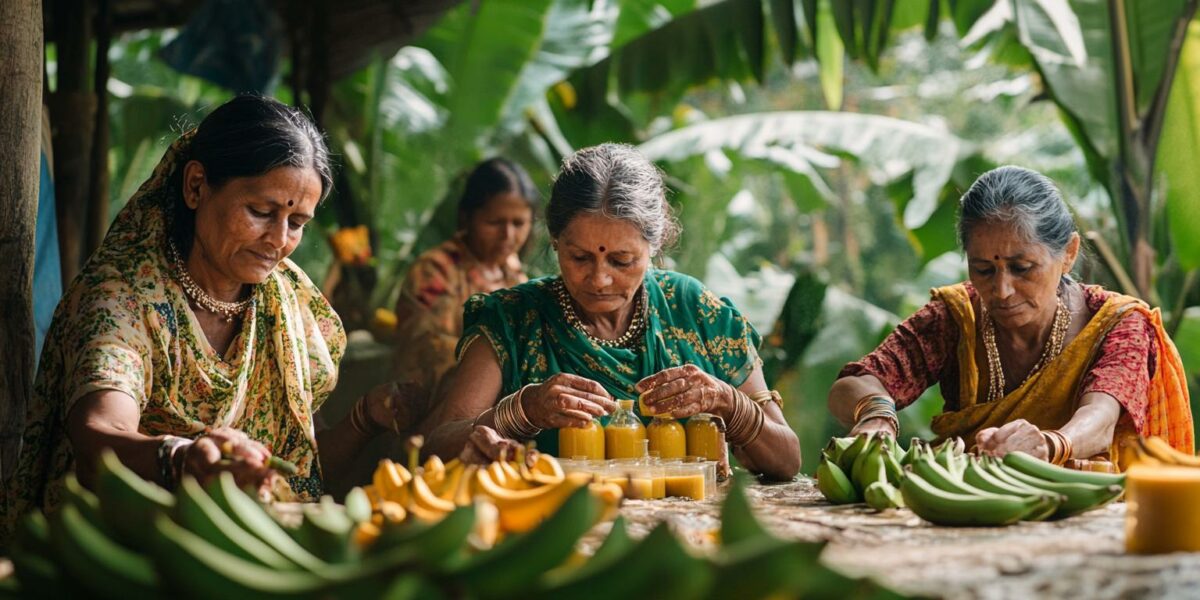Innovative Wine Production in Malawi
In northern Malawi, a group of female farmers is tackling climate change by transforming overripe bananas into wine. This ingenious approach not only addresses the devastating effects of extreme weather on crops but also creates a new source of income for the community.
Supported by the COMSIP Cooperative Union, these women have found a way to turn potential waste into a valuable product. The initiative showcases the power of community-driven solutions in the face of global challenges, highlighting the resilience and creativity of these farmers.
The process involves fermenting the bananas to produce a wine that is both unique and marketable. This effort has not only alleviated some of the economic pressures caused by climate change but also provided the women with a sense of empowerment and independence.
As climate change continues to impact agricultural practices worldwide, the Malawi banana wine project stands as a testament to the potential of grassroots innovation. It serves as an example of how communities can adapt to changing environmental conditions while preserving their livelihoods.
Challenges and Successes
Despite their success, these women face numerous challenges. Access to resources, marketing their product, and scaling production are significant hurdles. Yet, their determination continues to drive the project forward, inspiring others in the region and beyond.
The women have formed a cooperative, pooling their resources and knowledge. This structure has not only streamlined production but also strengthened their collective bargaining power in local markets. The cooperative model provides a framework for other communities facing similar challenges.
Key achievements of the project include:
- Improved economic stability for participating families
- Increased awareness about the impacts of climate change
- Enhanced community cohesion and support
The women’s success is a powerful reminder of the potential for small-scale initiatives to create meaningful change. Their journey is a lesson in resilience and innovation, proving that even modest efforts can yield significant benefits.
Broader Implications and Lessons
Beyond its immediate benefits, the banana wine project offers broader lessons for climate adaptation strategies. By turning a challenge into an opportunity, these women have demonstrated the importance of flexibility and creativity in addressing environmental issues.
The project underscores the role of local knowledge and traditional practices in crafting effective climate solutions. By drawing on their understanding of the land and climate, the women have created a sustainable model that others can emulate.
The support from organizations like COMSIP highlights the importance of external partnerships in fostering community-led initiatives. Such collaborations provide the necessary resources and expertise to help projects succeed and grow.
Ultimately, this initiative serves as a beacon of hope and inspiration. It illustrates the potential for innovative thinking to transform adversity into opportunity, paving the way for a more sustainable and equitable future.
Empowerment and Future Prospects
The project has empowered the women involved by providing them with new skills and opportunities. They have become role models in their community, demonstrating the power of female leadership in driving positive change.
Looking ahead, the potential for expanding the banana wine initiative is promising. With the right support and investment, it could serve as a model for other regions facing similar climate challenges, driving economic growth and sustainability.
As more communities take note of this innovative approach, the ripple effects could lead to broader changes in how agricultural communities adapt to climate change. The success of the Malawi women is a testament to the power of grassroots action.
In a world where climate challenges continue to mount, the story of these women offers a powerful reminder of the transformative potential of community-driven solutions. Their journey inspires hope and action, proving that even in the face of adversity, positive change is possible.



gabriellaecho
Does the wine have any health benefits? I mean, bananas are healthy, right?
lucas_illumination
Thank you for sharing this inspiring story. It’s a reminder of the power of innovation in tackling climate change. 🙌
rosetitan
Is there a way for this model to be replicated in other countries facing similar issues?
IsaiahInfinity
Turning bananas into wine sounds like something out of a fairy tale… or a really fun party! 😂
aubreymoonlight6
How can I support this project? I’d love to contribute to such an empowering cause!
Valeria_Solar
Do these women receive any kind of training for wine production, or is it mostly trial and error?
Noah
Interesting initiative, but how sustainable is it in the long run? Are there any environmental concerns with banana wine production?
Ariana_Empress5
This is such a creative solution to climate challenges. Kudos to these amazing women!
Robert
Wow, banana wine? That’s incredible! 🍌🍷 How does it taste compared to traditional wines?